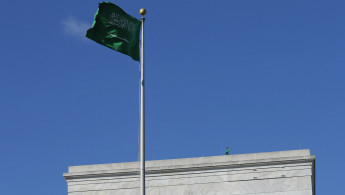Exodus of Saudi students from US over 'austerity, Islamophobia'
Exodus of Saudi students from US over 'austerity, Islamophobia'
The number of Saudi students studying on government scholarships in the United States declined by nearly a third this year.
4 min read
Saudi Arabia is cutting offerings to foreign scholarship students [Getty file photo]
The number of Saudi students studying on government scholarships in the United States declined by nearly a third this year according to official figures.
While racist attacks suffered by some Saudi students have been cited as a reason for students to drop US universities from their consideration, the main cause of the decline seems to be changes and cuts in government funding to the foreign scholarship programme.
Most universities and intensive English courses in the US saw a 27 percent drop on average in the number of Saudi students relative to last year, according to US official figures corroborated by the Saudi Cultural Attache in Washington D.C.
The number of new Saudi students sent to study in the US in 2016 was 10,980, bringing the total number of Saudi students enrolled in the US to 71,000 compared to 96,000 students in 2015.
In August, it was reported that the revenues of Idaho University, for example, were expected to decline by more than $5 million in the new academic year due to a drop in the number of Saudi scholarship students.
This decreased enrollment at the institution came after Idaho University witnessed a range of racist attacks on Saudi and Kuwaiti students, which prompted the Saudi Embassy in Washington to reconsider the scholarship programme with the university.
However, despite this and other incidents against Arab and Muslim students reported in the US, set to increase amid rising Islamophobia in the country, experts primarily blame the changes introduced by the government to the scholarship programme for the decline.
 |
Amid falling oil prices, Saudi Arabia cut back the generous scholarship programme that supported 200,000 students abroad in 2015. |  |
Amid falling oil prices, Saudi Arabia cut back the scholarship programme that supported 200,000 students abroad in 2015.
According to CNN Money, the government has been forced to tighten the rules of the $6 billion King Abdullah Scholarship Fund, limiting it to those attending one of the top 100 universities globally, or studying a programme rated in the top 50 in its field.
The government did not specify the scale of the cuts, but said the new conditions are part of its efforts to save money. It is cutting overall spending on education by 12 percent this year.
The programme was founded in 2005 and covered full tuition, medical insurance, a monthly stipend for living expenses, and an annual round-trip airfare for undergraduate, graduate and doctoral students.
It seems amendments to medical insurance payment specifically are discouraging Saudi students from applying, according to academic expert Dr. Majed al-Rashid.
According to Rashid, the Saudi government will stop paying cash as part of the coverage in countries where medical insurance is available. Many students, he said, used to rely on the cash to cover living and other expenses.
"Cutting insurance payments will increase financial burdens on students, especially in expensive countries such as the US," Rahid told The New Arab.
The biggest issue for Saudi students in the US is the low amount of money they receive in stipends, which do not exceed $1600 a month. This, Rashid said, is barely enough to cover living expenses, forcing Saudi students in many states to live in "unsafe areas" to save money.
With the cuts to insurance payments, many students no longer have any option but to go back, Rashid said, especially since the system does not allow them to work.
Previously, students in the US received $222 a month each per month in medical insurance costs, $222 for adult family members and $55 for children each.
A Saudi student in Seattle told The New Arab many students depend on this cash to pay for food. It also helps cover medical care not covered by their insurance. The student criticised the cuts for existing students, urging the decision be applied to new students only.
According to Rashid, the Saudi government will stop paying cash as part of the coverage in countries where medical insurance is available. Many students, he said, used to rely on the cash to cover living and other expenses.
 |
A Saudi student in Seattle told The New Arab many students depend on this cash to pay for food. |  |
The biggest issue for Saudi students in the US is the low amount of money they receive in stipends, which do not exceed $1600 a month. This, Rashid said, is barely enough to cover living expenses, forcing Saudi students in many states to live in "unsafe areas" to save money.
With the cuts to insurance payments, many students no longer have any option but to go back, Rashid said, especially since the system does not allow them to work.
Previously, students in the US received $222 a month each per month in medical insurance costs, $222 for adult family members and $55 for children each.
A Saudi student in Seattle told The New Arab many students depend on this cash to pay for food. It also helps cover medical care not covered by their insurance. The student criticised the cuts for existing students, urging the decision be applied to new students only.
Saudi Arabian students enrolled at US universities are the fourth biggest group of foreign students in the US, behind students from China, India and South Korea, according to the Institute of International Education.


![Minnesota Tim Walz is working to court Muslim voters. [Getty]](/sites/default/files/styles/image_684x385/public/2169747529.jpeg?h=a5f2f23a&itok=b63Wif2V)






